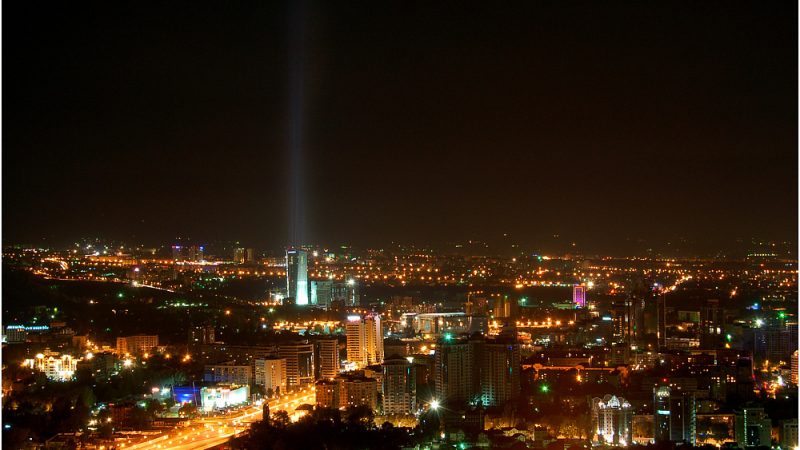The Advox Netizen Report offers an international snapshot of challenges, victories, and emerging trends in technology and human rights around the world. This report covers news and events from April 26 – May 10, 2019.
Kazakhstani netizens had virtually no access to major social media platforms or messaging services from May 7 to 9, according to local media reports and testimonies of internet users.
Facebook, Instagram, and YouTube were the platforms most heavily affected by what appears to have been a nationwide wave of “throttling”, a practice that slows users’ access to specific services, to the point that it becomes impossible to reach them.
The timing of the throttling wave appears to be intentional, as Kazakhstani political opposition leaders announced planned demonstrations for May 9, a national holiday in Kazakhstan marking the end of World War II.
On May 6, a young Kazakhstani man was arrested after he stood in a public square, holding up a blank sheet of paper. Police released him shortly thereafter. The man later wrote in a comment, “I have just put our authorities’ absurdity and insanity under [the] spotlight.” News of his ordeal prompted Kazakhstanis to post photos of themselves holding blank signs on social media.
The throttling of websites and services, alongside this peculiar act of intimidation by police, underline the ruling government’s deep discomfort with public acts of free speech, whether online or off.
Kazakhstan is undergoing an unprecedented political transition as former president Nursultan Nazarbayev announced on March 19 he would step down after almost three decades of undisputed rule. New elections are scheduled to take place in April 2020, leading to a renewal of political activism from the opposition as well as from civic activists.
Sri Lanka lifts ban on social media, after fatal attacks
Officials in Sri Lanka officially lifted a nationwide ban on major social media services on April 30. On April 22, within hours of the bombings that killed hundreds of people at churches and hotels in and near the capital, authorities blocked Facebook, Instagram, WhatsApp, YouTube, Viber, Snapchat and Facebook Messenger. Reactions to the move were mixed, with many expressing frustration with both the government and social media platforms, which have proven inept at controlling the spread of violent speech and disinformation in times of public emergency.
Ugandan feminist scholar faces trial in ‘vagina case’
Ugandan scholar and feminist activist Stella Nyanzi appeared in court on May 9 on charges of violating the Computer Misuse Act sections on cyber harassment and “obscene, lewd, lascivious or indecent” content production. At issue is a poem that Nyanzi published on Facebook, where she has more than 207K followers. The poem asserts that Uganda would have been better off if President Museveni had died at birth and includes several vulgar descriptions of the vagina and clitoris of Museveni’s deceased mother. As such, media have come to refer to Nyanzi’s as the “vagina case.”
Nyanzi, who is known for her radical activism on issues of gender and sexuality, is an outspoken advocate for girls’ education. She was arrested on similar charges in 2017, after she compared Museveni to a “pair of buttocks” on her Facebook page.
CIA warns blogger: ‘the Saudis may be spying on you’
American CIA agents paid an impromptu visit to the Palestinian-born blogger and social media critic Iyad el-Baghdadi last week at his home in Norway, where he has political asylum. The agents warned him that he had become a possible target of the Saudi Arabian government. El-Baghdadi has criticized the kingdom’s human rights record, and spoke out forcefully after journalist Jamal Khashoggi was killed at the Saudi embassy in Istanbul in October 2018.
El-Baghdadi is a well-known online advocate for human rights and democracy in the Arab region. His blog became hugely popular in 2011, due to his coverage and commentary on the uprisings across the region.
Russian media unmask anonymous anti-Kremlin blogger
The person behind StalinGulag, an immensely popular Russian-language Telegram channel and Twitter account known for acerbic, profanity-laden critiques of Russia's political system, recently revealed his true identity in an interview with BBC Russian.
Alexander Gorbunov, a 27-year-old Moscow resident, had been outed prior to the interview, by a different media outlet, RBC. After many months of attempting to disaggregate the two identities in the public imagination, Gorbunov came forward. In an interview with BBC, followers learned that Gorbunov is wheelchair-bound and suffering from a chronic, rapidly progressing condition known as Werdnig-Hoffman disease, the most severe type of spinal muscular atrophy. A bitter debate about the ethics of revealing Gorbunov’s identity has since ensued among local journalists.
Internet censorship continues to exacerbate the political crisis in Venezuela
After Venezuelan opposition leaders launched what they call the “definitive phase” of a transfer of power from the government of Nicolas Maduro to the opposition leadership of Juan Guaidó (which has yet to take place), major social media platforms including Twitter, Instagram, Facebook and YouTube became inaccessible, while broadcast connections for both CNN and BBC were cut off altogether.
Internet censorship research group NetBlocks reported that services were restored 20 minutes prior to Nicolás Maduro's streamed speech on May 1.
New research
- China’s Algorithms of Repression: Reverse Engineering a Xinjiang Police Mass Surveillance App – Human Rights Watch
- Transparency Report 2018 Q4 – Twitter
Subscribe to the Netizen Report
Afef Abrougui, Ellery Roberts Biddle, Alexey Kovalev, Amanda Lichtenstein, Filip Noubel, Taisa Sganzerla and Laura Vidal contributed to this report.








